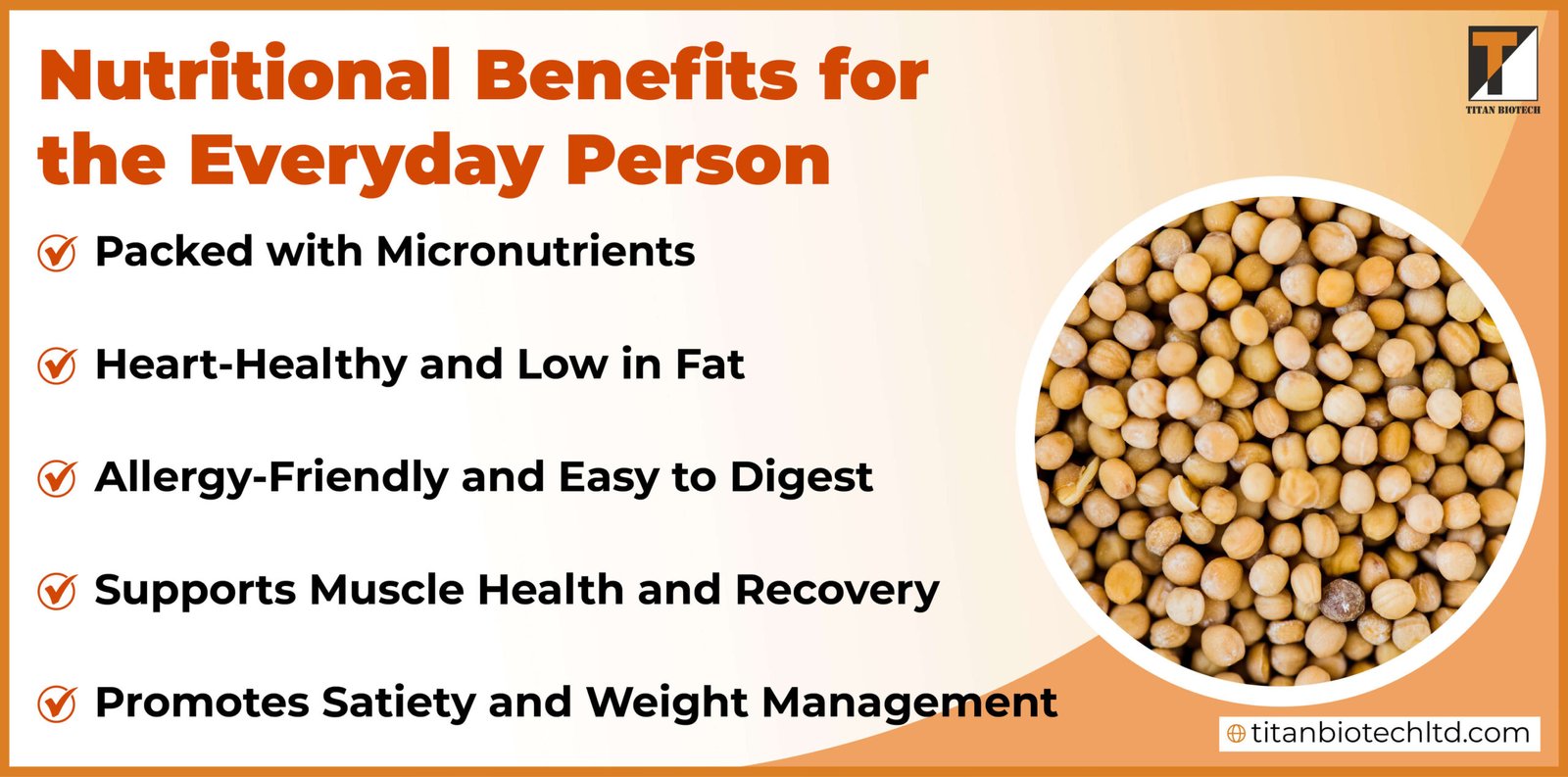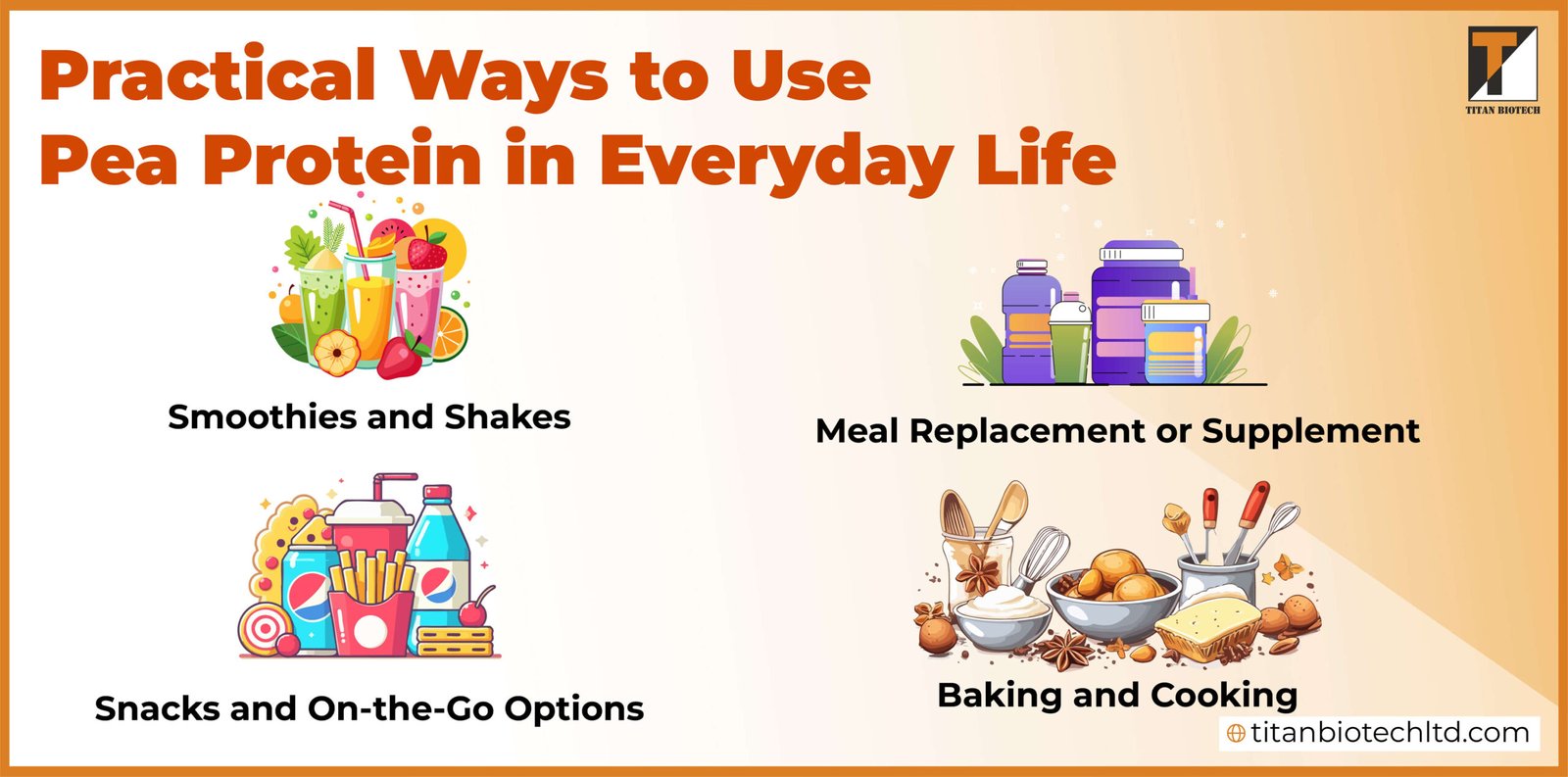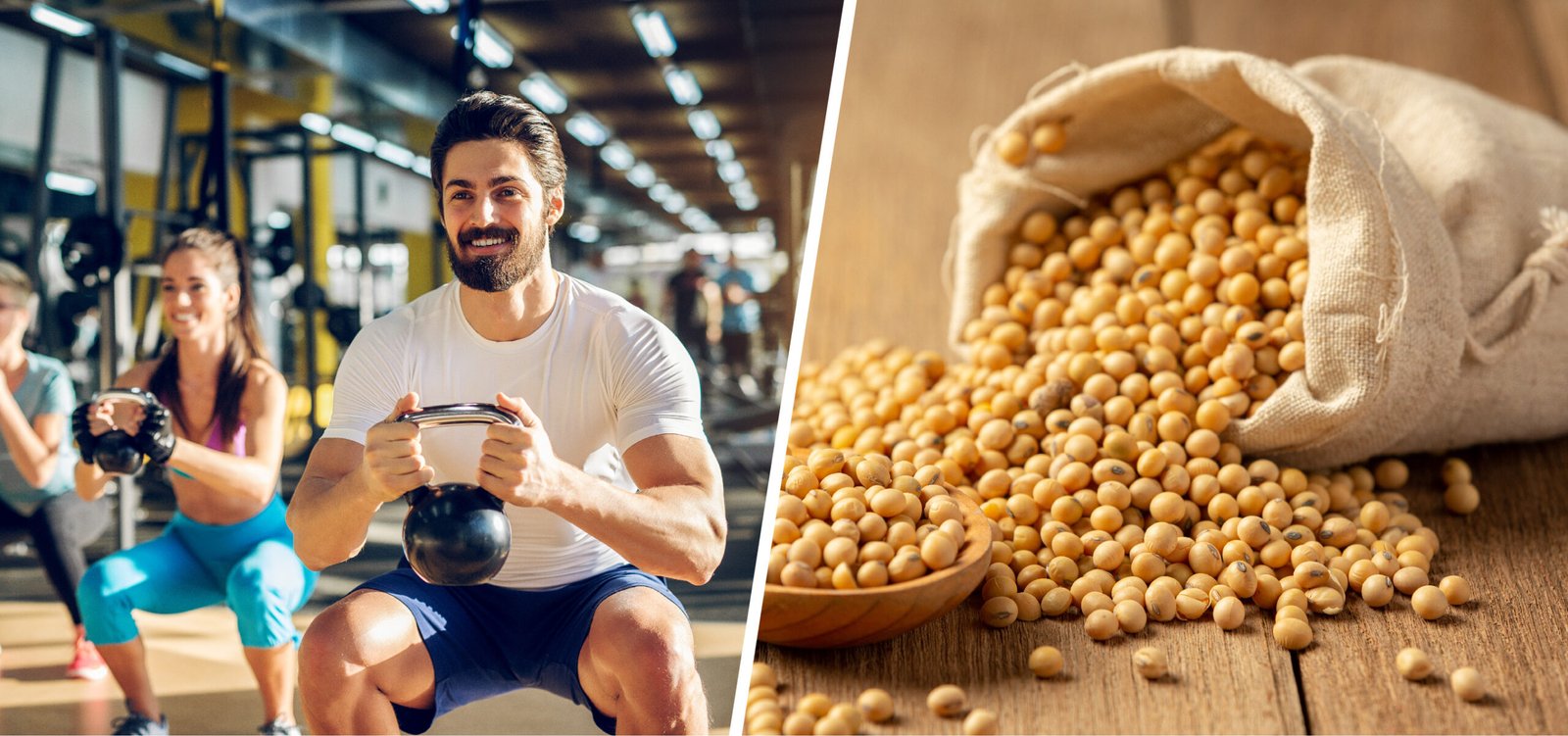Table of Content
- What is Pea Protein?
- Nutritional Benefits for the Everyday Person
- Practical Ways to Use Pea Protein in Everyday Life
- Pea Protein and Diverse Lifestyles
- Environmental and Ethical Benefits
- Potential Downsides and Considerations
- How to Choose the Right Pea Protein?
- Frequently Asked Questions (FAQs)
Pea protein has emerged as a versatile and powerful ingredient in modern diets, offering a plant-based protein source that appeals to a wide range of people, from fitness enthusiasts to those simply seeking healthier eating habits. Derived from yellow split peas, this protein-packed powerhouse is gaining popularity for its nutritional benefits, sustainability, and adaptability in everyday meals.
In this blog, we’ll explore the role of pea protein in the life of the everyday person, diving into its benefits, practical uses, environmental impact, and how it fits into diverse lifestyles.
What is Pea Protein?
Pea protein is a high-quality protein extracted from yellow split peas (Pisum sativum). Unlike whole peas, which are consumed as a vegetable, pea protein is made by drying and grinding peas into a fine powder, then isolating the protein through a process that removes most of the starch and fibre. The result is a concentrated protein powder that typically contains 20–25 grams of protein per serving, making it comparable to animal-based proteins like whey or casein.
What makes pea protein stand out is its impressive amino acid profile. While it’s slightly low in methionine, it’s rich in branched-chain amino acids (BCAAs) like leucine, isoleucine, and valine, which are crucial for muscle repair and growth. It’s also naturally gluten-free, dairy-free, and hypoallergenic, making it an excellent choice for people with dietary restrictions or sensitivities.
Nutritional Benefits for the Everyday Person

For the average person, incorporating pea protein into their diet can offer a range of health benefits. Here’s why it’s becoming a staple in many households:
-
Supports Muscle Health and Recovery
Whether you’re an occasional gym-goer, a busy parent chasing after kids, or someone who enjoys weekend hikes, muscle health is essential for daily activities. Pea protein provides a high-quality source of protein that supports muscle repair and maintenance. Its BCAA content makes it particularly effective for recovery after physical activity, helping to reduce muscle soreness and improve strength over time.
For the everyday person, this means pea protein can be a practical addition to post-workout smoothies or meals, ensuring you’re fuelling your body with the nutrients needed to stay active and energized.
-
Promotes Satiety and Weight Management
One of the biggest challenges for many people is maintaining a balanced diet while managing hunger. Pea protein is highly satiating, meaning it helps you feel full longer. This can be a game-changer for those trying to manage their weight or avoid overeating. Studies have shown that protein-rich diets can reduce appetite and support healthy weight loss by stabilizing blood sugar levels and reducing cravings.
Incorporating pea protein into breakfast smoothies, snacks, or even baked goods can help the everyday person stay satisfied throughout the day, making it easier to stick to healthy eating goals.
-
Heart-Healthy and Low in Fat
Pea protein is naturally low in fat and cholesterol-free, making it a heart-healthy option. It’s also rich in arginine, an amino acid that supports healthy blood flow and cardiovascular function. For the average person, adding pea protein to their diet can be a simple way to support heart health without relying on animal-based proteins, which can sometimes be high in saturated fats.
-
Allergy-Friendly and Easy to Digest
Food allergies and sensitivities are increasingly common, and pea protein offers a solution for those who can’t tolerate dairy, soy, or gluten. It’s hypoallergenic and gentle on the digestive system, making it suitable for people with sensitive stomachs or conditions like irritable bowel syndrome (IBS). For the everyday person, this means pea protein can be seamlessly integrated into their diet without worrying about adverse reactions.
-
Packed with Micronutrients
While pea protein is primarily valued for its protein content, it also contains essential micronutrients like iron, which is critical for energy production and oxygen transport in the body. This is especially beneficial for vegetarians and vegans, who may struggle to get enough iron from plant-based sources. For the average person, pea protein can contribute to meeting daily nutrient needs, supporting overall vitality.
Practical Ways to Use Pea Protein in Everyday Life

One of the biggest advantages of pea protein is its versatility. It can be incorporated into a wide variety of meals and snacks, making it accessible for people with busy schedules or limited cooking skills. Here are some practical ways to add pea protein to your daily routine:
-
Smoothies and Shakes
The most popular way to use pea protein is in smoothies or shakes. Its neutral flavour blends well with fruits, vegetables, and other ingredients.
-
Baking and Cooking
Pea protein can be added to baked goods like muffins, pancakes, or energy bars to boost their protein content. For example, mix a scoop of pea protein into pancake batter for a high-protein breakfast that’s perfect for busy mornings. It can also be used as a thickener in soups or sauces, adding a nutritional boost without altering the flavor.
-
Snacks and On-the-Go Options
For those with hectic schedules, pea protein can be used to create portable snacks like protein balls or bars. These are great for mid-afternoon slumps or pre-workout energy boosts.
-
Meal Replacement or Supplement
For those who struggle to get enough protein in their diet, pea protein can serve as a convenient meal replacement or supplement. A quick shake with pea protein, a banana, and some almond milk can replace a meal when time is short, ensuring you’re still meeting your nutritional needs.
Pea Protein and Diverse Lifestyles

Pea protein’s flexibility makes it suitable for a wide range of lifestyles, from athletes to busy professionals to those with specific dietary needs.
-
For Vegetarians and Vegans
For those following a plant-based diet, pea protein is a game-changer. It provides a complete protein source that rivals animal-based options, helping vegetarians and vegans meet their protein needs without relying on soy or dairy. It’s also a sustainable choice, aligning with the eco-conscious values of many plant-based eaters.
-
For Fitness Enthusiasts
Athletes and fitness enthusiasts often turn to protein supplements to support muscle growth and recovery. Pea protein is an excellent alternative to whey, offering similar benefits without the potential digestive issues associated with dairy. Its high BCAA content makes it ideal for post-workout recovery, whether you’re lifting weights or doing yoga.
-
For Busy Professionals and Families
For those with packed schedules, pea protein is a quick and easy way to boost nutrition. A protein shake takes less than five minutes to prepare, and pre-made protein bars or snacks can be grabbed on the go. Parents can also sneak pea protein into kids’ meals, like smoothies or baked goods, to ensure growing children get enough protein.
-
For People with Dietary Restrictions
Pea protein’s hypoallergenic nature makes it a safe choice for those with food allergies or intolerances. Whether you’re avoiding dairy, soy, gluten, or nuts, pea protein can be a reliable way to increase protein intake without triggering sensitivities.
Environmental and Ethical Benefits
Beyond its nutritional value, pea protein is also a sustainable choice, which resonates with many people who care about the environment. Here’s why:
-
Low Environmental Impact
Peas are a low-impact crop compared to animal-based proteins like beef or dairy. They require less water, land, and energy to produce, and they generate fewer greenhouse gas emissions. For the everyday person looking to reduce their carbon footprint, choosing pea protein over animal-based options is a small but meaningful step.
-
Supports Soil Health
Peas are a nitrogen-fixing crop, meaning they naturally enrich the soil with nutrients, reducing the need for synthetic fertilizers. This makes pea farming more sustainable and less harmful to the environment.
-
Ethical and Accessible
Pea protein is cruelty-free and aligns with ethical eating practices. It’s also relatively affordable compared to other protein powders, making it accessible to a wide range of budgets.
Potential Downsides and Considerations
While pea protein is a fantastic option for many, it’s not without its considerations. Some people may find the texture of pea protein powder slightly grainy, especially in shakes. Choosing a high-quality brand or blending it thoroughly can help. Additionally, pea protein is low in methionine, so pairing it with methionine-rich foods like grains or seeds can ensure a complete amino acid profile.
Some flavoured pea protein powders may contain added sugars or artificial ingredients, so it’s worth checking labels if you’re aiming for a clean diet. Lastly, while pea protein is generally well-tolerated, those with legume allergies should consult a doctor before trying it.
How to Choose the Right Pea Protein?
With so many options on the market, selecting a pea protein powder can feel overwhelming. Here are some tips for the everyday person:
- Look for Minimal Ingredients– Choose a product with few additives and no artificial flavours or sweeteners.
- Check for Organic or Non-GMO– If sustainability is important to you, opt for organic or non-GMO pea protein.
- Consider Flavour– Unflavoured pea protein is versatile for cooking, while flavoured options are great for shakes.
- Read Reviews– Look for brands with good reviews for taste and texture to ensure a pleasant experience.
Frequently Asked Questions (FAQs)
Is pea protein as effective as whey protein for muscle building?
Yes, pea protein is highly effective for muscle building due to its high content of branched-chain amino acids (BCAAs), particularly leucine, which is critical for muscle protein synthesis. While whey protein has a slightly more complete amino acid profile, pea protein is a comparable plant-based alternative, especially when paired with methionine-rich foods like grains.
Can pea protein cause digestive issues?
Pea protein is generally easy to digest and hypoallergenic, making it suitable for most people, including those with sensitive stomachs. However, some may experience mild bloating or discomfort if they consume large amounts or are sensitive to legumes. Starting with a small serving and gradually increasing can help assess tolerance.
Is pea protein safe for people with allergies?
Pea protein is free from common allergens like dairy, soy, and gluten, making it a safe choice for many with food allergies. However, individuals with legume allergies (e.g., peanut or soy allergies) should consult a healthcare professional before using pea protein, as cross-reactivity is possible in rare cases.
How much pea protein should I consume daily?
The amount of pea protein you need depends on your body weight, activity level, and dietary goals. A general guideline is 0.8–1.2 grams of protein per kilogram of body weight.

